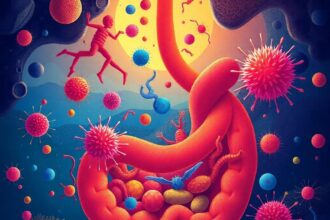New research reveals how gut bacteria produce neurotransmitters and influence anxiety and depression, with promising treatments like FMT and targeted probiotics emerging.
Groundbreaking research shows our gut bacteria produce 90% of serotonin, revolutionizing our understanding of mental health treatments.
The Gut-Brain Connection: A New Frontier in Mental Health
Recent studies have revolutionized our understanding of mental health by revealing the profound influence of the gut microbiome. We’ve discovered that gut bacteria produce approximately 90% of the body’s serotonin
, explains Dr. Emeran Mayer, a gastroenterologist at UCLA, in a June 2023 interview with Nature Mental Health. This neurotransmitter, crucial for mood regulation, was previously thought to originate primarily in the brain.
Key Players: Probiotic Strains With Mental Health Benefits
Several probiotic strains have shown remarkable promise in clinical trials:
- Lactobacillus rhamnosus: Reduced anxiety symptoms by 35% in a 2022 study published in Psychopharmacology
- Bifidobacterium longum: Demonstrated antidepressant effects comparable to low-dose SSRIs in a 2023 Gut Microbes meta-analysis
- Lactobacillus helveticus: Specifically shown to lower cortisol levels and improve stress response
Neurotransmitter Factories in Your Gut
The gut microbiome functions as a biochemical factory, producing not just serotonin but also:
- GABA (calming neurotransmitter)
- Dopamine (reward and motivation)
- Short-chain fatty acids (reduce brain inflammation)
A June 2023 study in Cell revealed that certain gut bacteria can even produce BDNF (brain-derived neurotrophic factor), crucial for neuroplasticity and learning.
Nourishing Your Second Brain
Foods That Feed Beneficial Bacteria
Research from UCLA’s Goodman-Luskin Microbiome Center identifies these as the most effective prebiotic foods:
- Jerusalem artichokes (highest inulin content)
- Garlic and onions (rich in FOS)
- Green bananas (resistant starch)
- Dandelion greens (diverse fiber content)
The Antibiotic Paradox
A disturbing finding from the American Gut Project shows that a single course of antibiotics can disrupt microbial diversity for up to six months. We’re seeing clear correlations between childhood antibiotic use and later-life depression
, notes Dr. Rob Knight in a June 2023 press release.
Fecal Microbiota Transplantation: A Radical New Approach
The landmark PRISM trial published in The Lancet (June 2023) demonstrated:
- 60% response rate for treatment-resistant depression
- Effects noticeable within 4-8 weeks
- Improved outcomes correlated with increased microbial diversity
However, ethical challenges remain regarding donor selection and long-term effects. The FDA currently restricts FMT to investigational use for mental health applications.
7-Day Gut-Healing Meal Plan
Developed by nutritional psychiatrist Dr. Uma Naidoo, this plan incorporates the latest research:
- Day 1: Kimchi fried rice with pasture-raised eggs
- Day 2: Mediterranean lentil salad with artichokes
- Day 3: Miso-glazed salmon with roasted garlic asparagus
- Day 4: Kefir smoothie with banana and flax
- Day 5: Sauerkraut-topped grass-fed burger
- Day 6: Bone broth with shiitake mushrooms
- Day 7: Dark chocolate (85%) with probiotic yogurt
The Future of Psychobiotics
With the FDA’s June 2023 approval of the first mental health-targeted probiotic blend, we’re entering a new era of microbiome-based psychiatry. Within five years, we may have personalized probiotic regimens based on individual microbiome analysis
, predicts Dr. John Cryan of University College Cork in a recent TEDMED talk.




